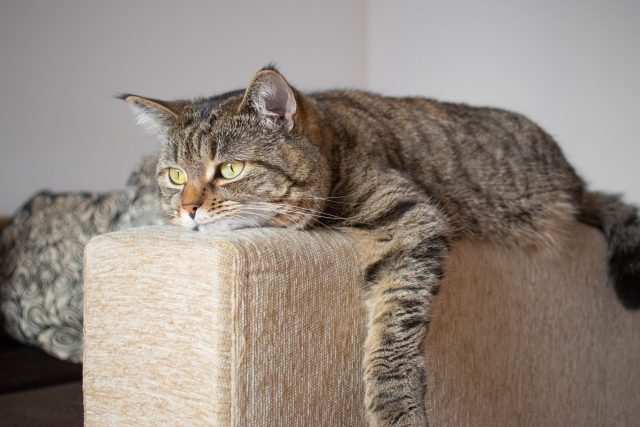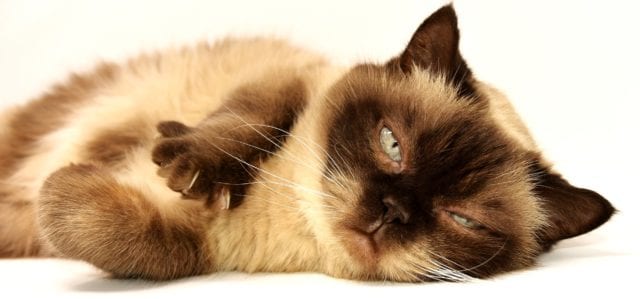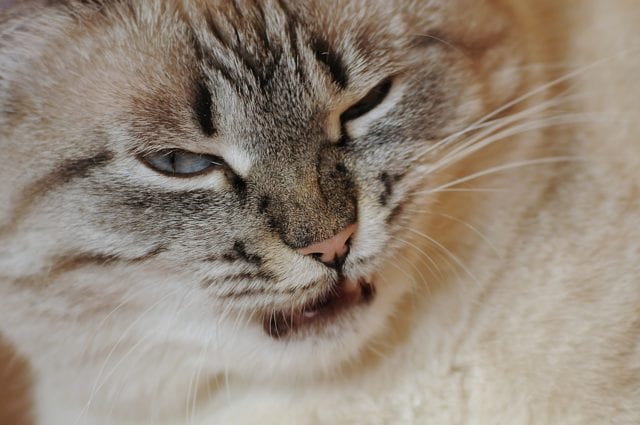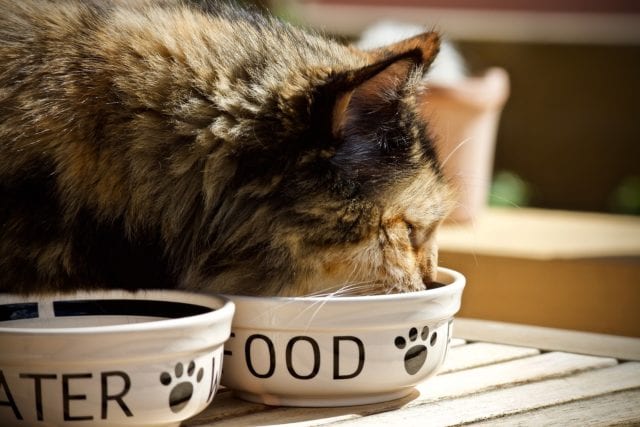Recognizing the signs of an unhappy cat is crucial in providing the best care for your feline friend. Changes in eating and grooming habits, alterations in vocalization, and social behaviors are all indicators of your cat’s well-being. Understanding these signs not only ensures the health of your cat but also strengthens the bond between you and your pet.
While some feline feelings, like purring and hissing, are easy to spot, other signs of unhappiness may be more subtle. Is your cat lazier than usual, showing less interest in toys and activities? Does your cat meow excessively or exhibit hostile behavior? These could all be signs of an unhappy cat.

Source: Shutterstock
The Ways Cats Tell You They’re Unhappy
#1. Lazier than Usual
If your cat is unusually lethargic and disinterested in playtime, it could be a sign of unhappiness. Providing stimulation through climbing structures, scratching posts, and interactive toys can help keep your cat active and engaged.

Source: Shutterstock
Encouraging your cat to stay active and providing a variety of toys can prevent boredom and promote a healthy lifestyle. If your cat remains lethargic, consult a veterinarian to rule out any underlying health issues.
Here are some tips to keep your cat happy and active:
- Install climbing structures or cat trees for your cat to explore.
- Provide scratching posts for your cat to maintain their claws and mark their territory.
- Offer a variety of toys that cater to your cat’s prey preferences.
- Consider leash training your cat for outdoor walks.
#2. Singing Sad Love Songs
Excessive meowing or vocalizations could be your cat’s way of seeking attention or expressing unhappiness. Providing extra love and affection can help alleviate your cat’s distress and strengthen your bond.

Source: Shutterstock
Ensure your cat has a clean bill of health to rule out any underlying medical issues that may be causing excessive meowing. Spending quality time with your cat can help alleviate their stress and improve their mood.
#3. Straight-Up Hostile Behavior
Hostile behavior, such as hissing or swatting, can indicate that your cat is unhappy. If your usually friendly cat becomes aggressive, seek veterinary advice to address any underlying issues causing this behavior.
#4. Food Picky Pants or Suddenly Chubby
Changes in eating habits, such as pickiness or overeating, can be signs of unhappiness in cats. Providing a variety of food options and monitoring your cat’s weight can help maintain their health and well-being.

Source: Shutterstock
Consult a veterinarian if your cat’s eating habits change suddenly or if they exhibit signs of dental issues. Monitoring your cat’s diet and providing a balanced meal plan can help prevent health problems associated with overeating or picky eating.
While chonky cats are undeniably adorable, sudden weight gain in a previously trim feline could indicate underlying issues such as unhappiness or potential health problems like diabetes. If changing their diet doesn’t address the issue of overeating or undereating, it’s important to consult with a vet.
Additionally, ensuring that your cat has access to fresh and clean water at all times is crucial for their well-being. Consider investing in a water fountain for pets to make hydration more enjoyable and engaging for your furry friend.
Cats are known for their meticulous grooming habits, so a decrease in grooming could be a sign of distress or illness. Excessive grooming, on the other hand, can lead to skin irritation and bald patches. If stress is suspected as the cause, it’s essential to identify and address the underlying factors contributing to your cat’s unhappiness.
Litter box issues are another common indicator of a cat’s discontent. If your cat starts eliminating outside of their litter box, it could be due to various reasons such as litter preference or feeling unsafe. Maintaining a clean litter box and providing multiple boxes for multi-cat households can help alleviate this problem.
Body language is a key indicator of a cat’s emotional state. Constantly tense posture, flattened ears, or a flicking tail are signs of distress. If your cat exhibits these behaviors consistently, it’s important to investigate and address the root cause of their unhappiness.
Cats may also exhibit avoidance behavior, such as hiding or distancing themselves from their owners. Continuous avoidance could indicate underlying stress or discomfort, and it’s crucial to create a safe and comfortable environment for your cat.
Lastly, fear and anxiety can contribute to an unhappy cat. Excessive hiding, aggressive behavior, or changes in eating habits are signs of anxiety that should not be ignored. If you suspect your cat is experiencing anxiety, consult with a vet to explore potential solutions and support your feline companion in finding peace and happiness. sentence in a different way:
The car was parked in the driveway.
The vehicle was situated in the driveway.

